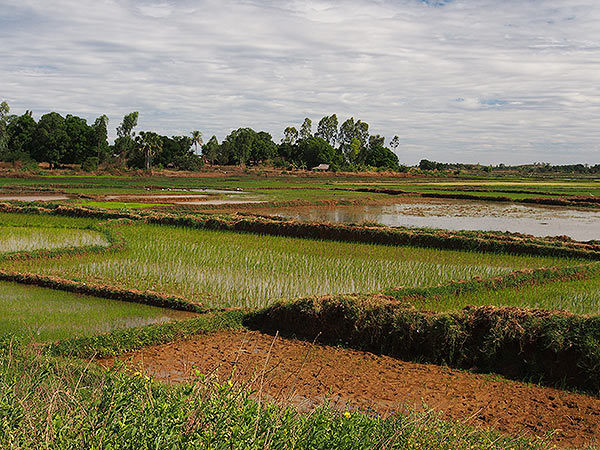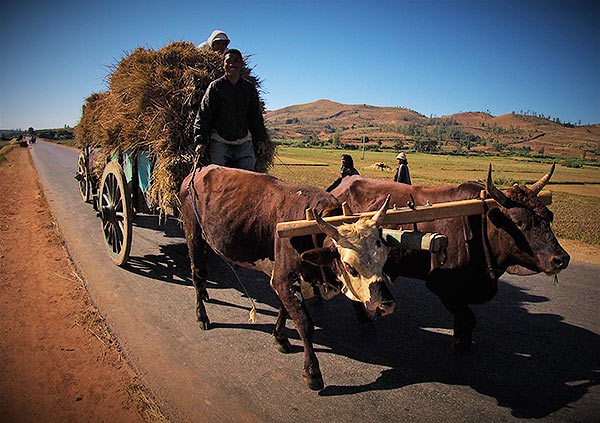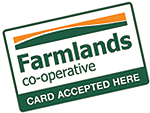 |
|
|
|
Issue 86 / Winter / June 2017
Hi [firstname]
 Welcome to the June edition of the Seedata newsletter and sorry it's a bit late, I've been away.
Welcome to the June edition of the Seedata newsletter and sorry it's a bit late, I've been away.
I did a cycle tour through Madagascar recently and it was really interesting for me to see this remarkable country.
The people I spent most of my time among were farming folk and they certainly grew a wide range of crops.
I saw wheat, oats, rice (heaps), many vegetable crops as well as fruits of every description. You could even buy giant avocados for 20 New Zealand cents!
They all seemed to be experts at whatever they farmed and certainly made the most from what they had... and surprise, surprise, water access was the key to success for them.
In this month's SeedData newsletter we look at suitable spring barley cultivars and a new concept in maize seeds.
Please browse these topics below:

Spring Barley options.
Spring sown Barley season is rapidly approaching and we are starting to field questions as to what are the best cultivars available for the coming Spring.
Almost all our enquires relate to using barley as a spring whole crop cereal silage options and as it's been a while since we looked at the most suitable cultivars we thought it a good time to give you an update.
As with a lot of seed cultivars there are many barley cultivars to consider and for the sake of my sanity I've restricted information to four cultivars.
These cultivars have been in trials for at the least 4 years, have been trialled throughout New Zealand and will be available for sale this season.
So, in alphabetical order they are:
Booma:
 Booma is a medium maturing feed barley that is recommended to be sown from May to October in Canterbury and from August to November in the North Island and Southland.
Booma is a medium maturing feed barley that is recommended to be sown from May to October in Canterbury and from August to November in the North Island and Southland.
Medium to high feed barley sowing rates are recommended (seed size is medium and it has good tillering ability).
Booma achieves top yields in Canterbury from autumn and spring sowing and from spring sowing in the lower North Island.
While its best yields are typically on irrigated land, it also performs very well in dryland situations, particularly on heavy land.
Booma will need protection from scald and leaf rust like most barleys.
It has good tolerance to net blotch and ramularia.
Booma is well suited to a 2-spray fungicide programme to ensure potential yields can be achieved Booma is medium tall with good straw strength but will benefit from PGR's in all autumn and early spring sown crops and those with over 8 tonne/ha yield potential.
Bumpa:
 Bumpa is a medium maturing feed barley that can be sown from July to October in Canterbury and the North Island.
Bumpa is a medium maturing feed barley that can be sown from July to October in Canterbury and the North Island.
It is similar in style to most other spring barleys and shows consistently high yields.
Medium to high feed barley sowing rates are recommended (seed size is high and it has good tillering ability).
It has high relative yields in good conditions and performs at its best under high inputs but is also well suited to lower inputs in early spring sown dryland conditions.
Spring sown trials to date show Bumpa achieves top yields in Canterbury and the lower North Island.
Bumpa will need protection from BYDV and scald. It has good tolerance to net blotch, leaf rust and ramularia.
Bumpa is well suited to a 2 fungicide programme.
It is medium tall with good straw strength and could benefit from PGR's in all early spring sown crops and those with over 8t/ha yield potential.
Garner:
 Garner is a high yielding feed barley variety, in general Garner has consistently been a top performer in spring trials.
Garner is a high yielding feed barley variety, in general Garner has consistently been a top performer in spring trials.
It produced among the highest 4 years mean of all established cultivars at the end of the 2012-13 season in both the Southern North Island (104%), and Canterbury (105%) and was above average in Southland (101%).
Having large grain and low screenings, it consistently produces superior grain quality compared to many other cultivars.
Garner performs best from a spring drilling; however, CPT autumn results have shown it produces good yields (marginally below Tavern) from a late autumn drilling.
The recommended drilling time is between May – September.
Garner can be planted as late as October/November, this late drilling will better suit the Lower North Island.
Garner tillers well and target plant populations should be within the normal seed rate guidelines.
Disease resistance Garner is moderately susceptible to many common barley diseases, but it has good net blotch and mildew resistance.
Late spring sowings give lower disease pressure and Garner may be grown with lower fungicide inputs.
Sanette:
 Sanette is a high yielding feed barley variety, Sanette has consistently been a top performer in both autumn and spring trials.
Sanette is a high yielding feed barley variety, Sanette has consistently been a top performer in both autumn and spring trials.
It had the overall highest 4 years mean of all established cultivars at the end of the 2013-14 season in both the Lower North Island (104%), Canterbury (110%) and Southland (107%) from spring sowings.
In autumn trials Sanette yielded an average of 109% (two Canterbury sites). Sanette produces above average grain quality despite very high yields.
Sanette is a cultivar with an intermediate maturity and is seven to ten days later maturing than Dash.
Seed rate and tillering characteristics Sanette is a medium to high tillering variety and target plant populations should be within the standard autumn and spring barley seed rate guidelines.
Disease resistance Sanette is rated as moderately resistant to scald and net blotch and moderately susceptible to leaf rust.
I hope this information has been helpful. Should you wish to study these cultivars performance in your region please click on the following link to the FAR Cultivar Evaluation download, or contact us for more information.
Brochure Download Link: FAR - Spring sown Wheat and Barley 2015/2016 brochure.
Website Link: Check out our Forage Cereals website page.
Contact Link: Contact Specialty Seeds if you have any other questions.
Back to top
 New Maize cultivars look interesting.
New Maize cultivars look interesting.
I seem to spend a fair bit of my day reading the vast number of magazines or promotional material that come over my desk.
From time to time something slips in without much fanfare but pricks up my interest and the new maize cultivars from Pioneer are no exception.
The most interesting of these new cultivar releases is the ones that use Pioneer's 'Optimum Aguamax' technology.
In a nutshell, these cultivars have been selected for their water efficiency and the logo they use is certainly something we should all be at the least interested in, it is 'More out of every drop'.
Optimum Aquamax hybrids offer growers additional choices to help minimize risk and maximize crop productivity under drought stress or water limited areas.
Developed and tested utilizing Pioneer's extensive drought technology research and proprietary Accelerated Yield Technology (AYT) system, Optimum AQUAmax hybrids help maximize water access through an extended root system, deliver yield stability and help to minimize the risk of decreased yield due to drought stress.
At this stage, this technology is currently available in the following four new cultivars below. Please feel free to contact us if you have any questions.
Pioneer P9241 - Suitable for the South Island.
Pioneer P0725 - Suitable for the top of the South Island & Bay of Plenty.
Pioneer P9911 - Suitable for the all of the North Island.
Pioneer P0791 - Suitable for the top of the North Island & Bay of Plenty.
Website Link: Check out the Sorghum / Maize website page on the Specialty Seeds website.
Contact Link: Contact Specialty Seeds if you have any questions.
Finchy's photos of the month.

Rice is the mainstay for most farmers in Madagascar.
This is one of the few trial farms I saw close to a town called Majunga..
|
Back to top


Zebu carts are the normal transport around this part of the world.
It's amazing to see some of the loads they carry.
|


As always, we hope this issue has been of some value to you. If you have a comment on this newsletter or anything on our website, please give us a call on our Freephone: 0800 727 8873, send us an email at: mail@specseed.co.nz.
Kind Regards

Stephen Finch & David Percival
Specialty Seeds - New Zealand
|
|
|
|
 |
|
|

|
If you are having trouble viewing this email, .
If you would like to be removed from this newsletter please click here to
|
